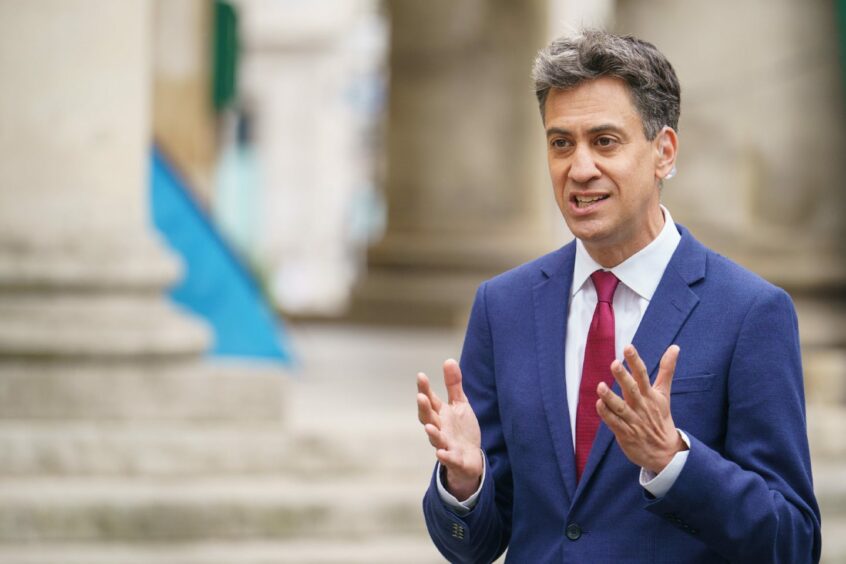
Shadow climate secretary Ed Milliband has admitted the UK will continue using North Sea oil and gas for “a long time to come”, including under a Labour government.
But the staunch critic of the sector said, despite this, he would implement a heavier windfall tax on the industry.
Meanwhile industry body Offshore Energies UK (OEUK) accuses Labour of “misrepresenting” the global profits of energy companies, and how much tax could actually be levied in the UK against overseas earnings.
It comes as Shell reports record earnings today – though just five percent of that comes via the UK.
Currently, firms are taxed at a 75% headline rate in the UK, leading to warnings over investment going overseas in light of the levy, which also threatens the industry’s ability to use free cash flow for renewables.
Appearing on the BBC’s Today programme, presenter Nick Robinson said to Miliband: “We will be using oil and gas in this country, not just for years to come, but arguably for many decades to come, and it doesn’t save the planet if what we do is use oil and gas from Russia, from the Gulf States, from Saudi and elsewhere, rather than take it from the North Sea.”
Mr Miliband replied: “We’re going to carry on using the North Sea, including under a Labour Government, for a long time to come, you’re right about that Nick.
“But why is giving massive tax breaks for new exploration in the North Sea the wrong answer? It’s the wrong answer because, as I say, it will make no difference to the price consumers are paying. The average time it takes, it takes 28 years for new exploration to new production of North Sea oil and gas.
“The answer for our country is to go for renewables.”
No new investment
The statement lands days after Labour leader Sir Keir Starmer said there’d be no new investment in oil and gas under his government.
But figures from 2021 via the industry regulator showed UK gas production could stop by 2030 without new investment – so a switch away from gas in the UK would need to happen before then if Britain were to avoid total reliance on imports.
A key point of Mr Miliband’s argument for increasing the oil and gas levy was Shell making record profits and firms “paying out far more in shareholder buybacks and dividends than investing in the low-carbon economy”.
Around 5% of Shell’s profits are from the UK – and the firm is paying out around $5bn to investors globally this year, off the back of its record returns, through buybacks and dividends.
The firm has also pledged £25bn in UK investment in years ahead, 75% in low carbon.
However, its shareholder returns last year and for 2023 are above its investment levels in renewables globally.
Miliband to extend the windfall tax on oil producers
Elsewhere, the brunt of North Sea producers who are being asked to cut emissions and invest in low carbon projects are independents which are not insulated by global profits and may look elsewhere to invest.
EnQuest recently said the North Sea is no longer its growth area, while Harbour Energy has blamed the windfall tax for Aberdeen job cuts.
Mr Miliband was asked by Nick Robinson whether the oil and gas windfall tax, which has been introduced and then extended since May last year, should be extended again.
He said: “Yes. This is why people are sick and tired of the way this country is run, because one and the same time you’ve got millions of people who cannot afford heat and power, you’ve got a government that is saying there is nothing we can do. Prices are going to go up by another 40%, Nick, in April.
“And at the same time, Shell making record profits, the windfalls of war, unexpected, unearned profits and a government that fails to levy a proper windfall tax, with massive loopholes for companies.
“That is why this country has to change and why, in my view, the government in this country has to change.”
‘Avoid these misrepresentations’
On the programme, Mr Miliband was told 95% of Shell earnings come from outside the UK, raising questions about levying profits not made in the UK.
Mr Miliband did not address the point about profits made elsewhere, but said “we’re not going to get out of a fossil fuel crisis by saying let’s have more investment in fossil fuels”.
Trade body OEUK meanwhile has accused Labour of misrepresenting the tax system, saying “politicians in all parties know very well how global tax law works and we would call on them to avoid these misrepresentations”.
Sustainability director Mike Tholen said: “These calls for extra windfall taxes on profits made outside the UK make no sense and could never be implemented. The UK is subject to global tax agreements which say that it cannot tax profits made by companies outside of the UK.
“Multinationals like Shell and BP are not single companies but groups – with multiple subsidiaries. Subsidiaries based in other countries will pay taxes – but in those countries. The UK cannot then impose a second tax just because the group has its headquarters in the UK. If we did, they would all leave.
“We already have a 75% windfall tax on profits made in the UK. It would also be invidious for the UK to tax profits made in other countries too. The taxes on those revenues belong to the countries where they were generated. It would be wrong for another country’s revenues to be effectively seized by the UK.
“Our leading politicians in all parties know very well how global tax law works and we would call on them to avoid these misrepresentations.”

